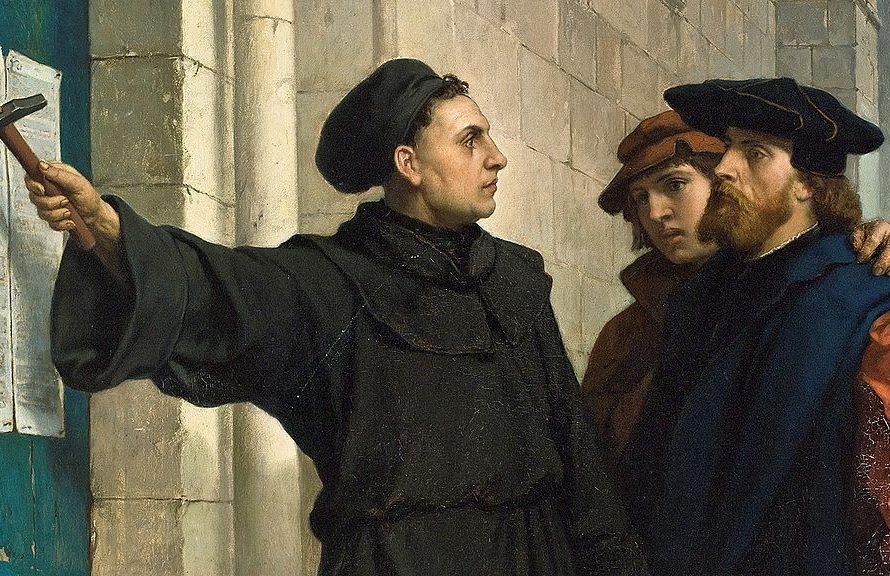“…. The bishop gathered
what he could.
Beside the River Swift, he lit a pile of wood
and tossed the bones on one at a time,
cursing the heretic from limb to limb.
Afterwards, they shoveled ash
into the water
and no one even thought
the word martyr.”
– Poet Thom Satterlee, “Burning Wyclif”
* * *
In the summer of 1519, nearly 15 years after a thunderbolt had knocked him into the monastery and nearly two years after he publicly criticized the pope in his 95 Theses, Martin Luther stood on a platform in Leipzig, Germany, defending his controversial ideas. His opponent in the dispute was Johann Eck, considered one of the fiercest debaters in the land. Although he met his match in Luther, Eck soon pinned him as a heretic in a way that even he didn’t expect.
“I see,” Eck said to Luther, “that you are following the damned and pestiferous errors of John Wyclif, who said, ‘It is not necessary for salvation to believe that the Roman Church is above all others.’ And you are espousing the pestilent errors of John Hus, who claimed that Peter neither was nor is the head of the Holy Catholic Church.”
At first, Luther himself spurned the accusation that he was spreading other men’s heretical ideas. He had no particular expertise in the ideas of Wyclif or Hus. Yet, after an evening of research, he returned to the debate with a startling admission.
“Among the articles of John Hus, I find many which are plainly Christian and evangelical, which the universal Church cannot condemn,” Luther said.
Nearly a century before Luther made this declaration, a council of church leaders meeting in the city of Constance, in southern Germany, condemned Hus as a heretic. They consigned him to be burned at the stake—despite the promise of a safe conduct to and from the council. A decade later, in 1427, the pope also commanded that Wyclif’s corpse, which had been in the grave for 43 years, should be exhumed and burned.
This account raises two questions: Why were these men condemned as heretics? And what kind of legacy did they leave for Luther and other Reformers to build upon?
Born in the county of York, England, around the year 1328, Wyclif studied at the University of Oxford, where he was distinguished as a doctor in theology. Coming into the service of the king, he found the support of Duke John of Gaunt, himself a king’s son, who protected Wyclif as he broadcast his radical ideas for reform. Among other ideas, he insisted that Scripture should be the supreme authority for the church’s teachings. He also argued for the closure of monasteries and branded the pope as the Antichrist. Additionally, he attacked transubstantiation—that is, the belief that the bread and wine used during the Lord’s Supper are miraculously transformed into the real body and blood of Christ. But despite his contentious ideas, and partially due to the protection he gained from John of Gaunt, Wyclif’s life came to a natural and non-violent end in 1384.
But Wyclif’s ideas didn’t die. In England, they were spread abroad among a network of his followers, called the Lollards. Yet, after a failed attempt to grab political power for the movement, the Lollards were quickly pushed underground, where they fed on the English Bible translations inspired by Wyclif.
Wyclif’s writings and ideas, however, also spread across the English Channel to the land of Bohemia, which bordered Eastern Germany. There, they found a strong proponent in Hus, who reshaped them and used them to promote his own vision for reform. Unlike Wyclif, Hus met a brutal end in 1415, yet his ideas also continued to flourish in Bohemia. Long before Luther faced accusations of heresy during the Leipzig debate of 1519, the Bohemians had broken away from Rome to create their own church based on the ideas of Hus.
No doubt, Luther promoted ideas similar to those of Wyclif and Hus. But when condemned as a Hussite during his Leipzig debate with Johann Eck, he immediately rebuffed the accusation. Despite similarities, Luther’s vision for Reformation was fundamentally different than the visions of Wyclif and Hus, according to historian Heiko Oberman in his biography, Luther: Man between God and the Devil. Ultimately, Luther’s roots as a Reformer didn’t grow from the seed that Wyclif and Hus had sown.
Nevertheless, as another historian has noted, Wyclif and Hus provided a fine “pedigree” for Luther and other Reformers, who needed support in their attack of the Roman church. English Reformer John Bale, followed by the more renowned John Foxe, later called Wyclif the “morning star” of the Reformation. And Luther himself couldn’t help but gain inspiration from Hus, the martyr.
“For Luther St. Hus-the-martyr was very much alive,” Oberman writes in his biography. “Luther was convinced that the prophecy Hus had made before his execution applied to the Reformation: ‘Holy Johannes Hus prophesied about me when he wrote from his Bohemian prison that they might now be roasting a goose …, but in a hundred years they will hear a swan sing, which they will not be able to silence.’”
And, indeed, even 500 years later Luther’s swan-song continues.

